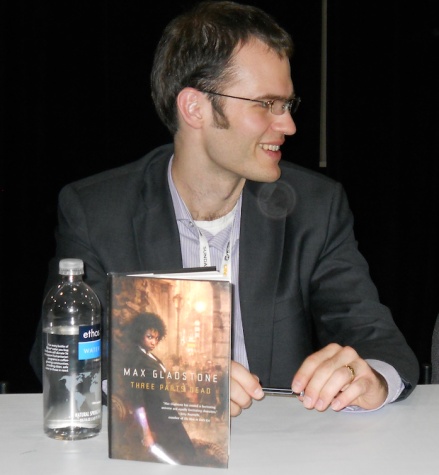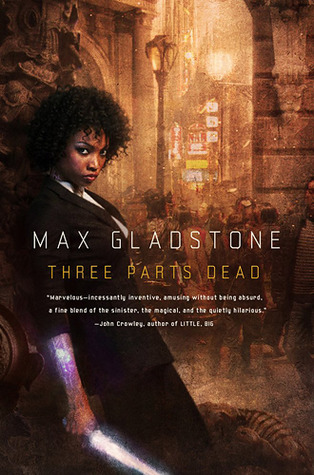Max Gladstone’s Three Parts Dead is a fantasy that doesn’t read like a fantasy, partly because the protagonist, Tara Abernathy is an associate contracts lawyer: you don’t typically get one of those as your heroine. Except that it works, not only because Tara and her boss Elayne Kevarian are damn good at their jobs, but also because those contracts define the structure, accessibility, and use of magic, called Craft. The world also includes familiar fantasy elements–from magical boarding schools to vampires to almighty gods–but gives them a fresh take that immediately draws you in.
Gladstone’s world-building involves magical takes on fields that aren’t typically addressed in fantasy—in this case, litigation. Gods, rather than being mysterious, unknowable, and omnipotent, have direct relationships with their followers. Their abilities bring happiness and joy to believers, create rain in the desert, cure illnesses—but also fuel metropolitan transit systems, back military operations, and promote trading partnerships with multinational corporations. Like all powerful people, then, the divine are always in need of good legal representation.
That’s where firms like Kelethres, Albrecht, and Ao come in: to negotiate the tangled web of deals that gods enter into. When one of these gods, Kos Everburning of Alt Coulomb, turns up dead, Tara and Ms. Kevarian are on the case. They have to prove that the god didn’t irresponsibly default on his contract, but was murdered, and they have to do it fast, before word of Kos’s death prompts his creditors worldwide to demand restitution, and the people of Alt Coulomb riot over the loss of their god.
Gladstone explained his take on divinity in the world of Three Parts Dead during a recent sit-down interview. “How would a world work in which you actually felt every morning, when you prayed to that god, your furnace would turn on?” he said when we met earlier this month. “That was how you turned your furnace on?” Grounding the metaphysical only highlighted what he felt was most important in the book: “In a world where those contracts are external and not just implied, how would that change the relationship between you and your god?”
We covered the big, metaphysical questions explored in Three Parts Dead, how his work in China influenced his writing, and why Terry Pratchett is awesome.
When it comes to writing, Gladstone tackles the divine as practical magic. And all of his characters come at this from different perspectives on faith. Tara “doesn’t have the patience or the time for gods or feelings of grace or anything. She thinks that she can stand on her own and take care of herself. That’s the way that a lot of Craftsmen and Craftswomen feel… that they spend so much time in the root constituent pieces of godhood that they don’t have much of a romantic notion of it all.”
In contrast with Tara is the chain-smoking priest of Kos, Abelard: “This is throwing him into a pretty personal conflict. He’s having a crisis of faith, struggling with the idea what his faith means now the focus of his devotion is gone.”
Gladstone draws inspiration from a lot of different writers, from Robin McKinley to Roger Zelanzy, especially The Chronicles of Amber series, and also historical fiction writer Dorothy Dunnett. Terry Pratchett and his Discworld books, however, get the gold star. He particularly enjoys how Pratchett builds up a world piecemeal through various independent stories about a diverse cast spread across one world. For example, Gladstone talks about the City Watch books and his favorite Discworld character, Vimes. Readers can follow Vimes’s evolution throughout those books or simply pick up Night Watch and “enjoy it as a police officer-time-travel-fantasy-crazy-magic story with maybe a footnote or two.”
 “That’s one of the things that’s most impressive to me about his career,” Gladstone explained, “that ability to keep contributing books that contribute to a larger worldview and keep adding to that worldview in all these different characters that negotiate their way through it so that an story emerges in time even though there is no driving ‘book by book fight to stop the bad guy.’ And is more true to how we live our lives.”
“That’s one of the things that’s most impressive to me about his career,” Gladstone explained, “that ability to keep contributing books that contribute to a larger worldview and keep adding to that worldview in all these different characters that negotiate their way through it so that an story emerges in time even though there is no driving ‘book by book fight to stop the bad guy.’ And is more true to how we live our lives.”
Gladstone also drew upon his experiences abroad. He taught in rural China for two years, and while there he spoke to a lot of locals about life during the Cultural Revolution. “How does a community reform itself after being affected by historical violence?” he wondered. “That idea really stuck with me. These people lived in a time where they and their neighbors strung each other up in their front yards. And after living through experiences like that, how can society move on with those same people afterward?” In the backstory to Three Parts Dead—the God Wars that ended fifty years before the start of the story—humans fought with divine beings for the right to rule themselves. Various societies made different compromises with their gods, from keeping them to killing them to something in between.
Gladstone also considered the power dynamics of various civilizations and how their gods would interact with each other. “Colonization,” he said, as an example, “would play out very differently. You can’t force your way into a country because you have guns and they don’t, if everyone has gods to defend them. You don’t have massive plagues during first contact situations if the local gods have the capability of healing people when their sick.” In the same way, he also has the opportunity to point out how attitudes toward gender roles and sexual identity can vary because all of these societies would be on a more level playing field with each other, and he’s very interested in exploring those in future books.
Complex food for thought folded into an adrenaline-soaked read: Three Parts Dead really manages to keep to letter of the law—without forgoing its fantastical spirit.
Three Parts Dead is now available, and readers can also follow the latest about Max Gladstone on his website.
Ay-leen the Peacemaker thinks more professions would be exciting with a little magic. She also runs the multicultural steampunk blog Beyond Victoriana, writes academic things, and tweets.










